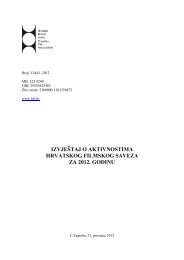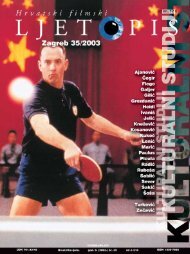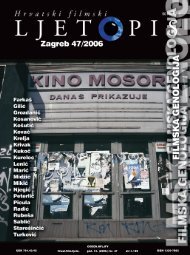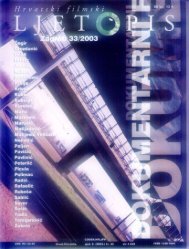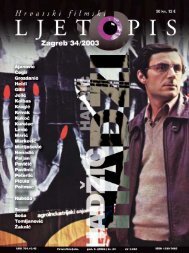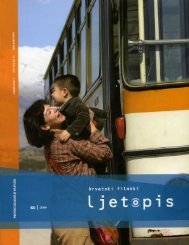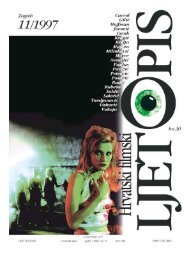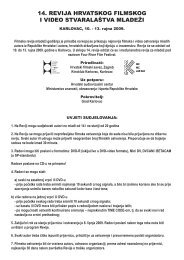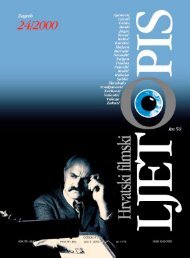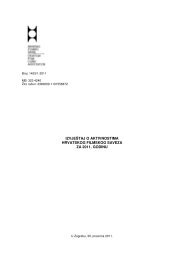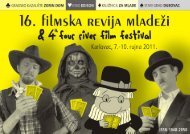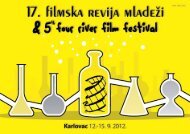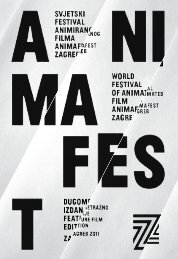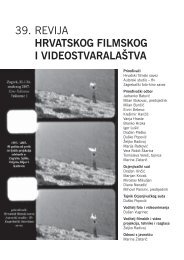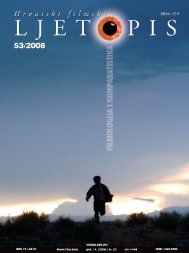Hrvatski filmski ljetopis, broj 56 (2008) - Hrvatski filmski savez
Hrvatski filmski ljetopis, broj 56 (2008) - Hrvatski filmski savez
Hrvatski filmski ljetopis, broj 56 (2008) - Hrvatski filmski savez
You also want an ePaper? Increase the reach of your titles
YUMPU automatically turns print PDFs into web optimized ePapers that Google loves.
hfl_<strong>56</strong>-q6.qxp <strong>2008</strong>-12-18 15:22 Page 174<br />
174<br />
Hrvat. film. ljeto, Zagreb / god 14 (<strong>2008</strong>), br. <strong>56</strong>, str. 167 do 174 Sa`eci / Summaries<br />
tvo nije stilski strogo definirano, ve} se mijenja i razvija od filma do filma,<br />
od suradnje s razli~itim redateljima. Kao posebna kvaliteta njegovog rada<br />
nagla{ava se kompozicija kadra i rad sa svjetlom, kad nastoji maksimalno<br />
po{tivati objekt snimanja, a istovremeno kompozicijskim rasporedom i prividnom<br />
jednostavno{}u sa~uvati dojam neposrednosti pogleda i nenametljivosti<br />
kamere.<br />
Tomislav Pinter<br />
Blijeda sje}anja (ulomci autobiografije)<br />
UDK: 778.53-051Pinter, T.<br />
Ulomak iz autobiografskoga rukopisa nedavno preminulog hrvatskog snimatelja.<br />
prvo poglavlje opisuje njegov dolazak u Jadran film krajem 1940ih;<br />
drugo poglavlje rad na filmu Ponedjeljak ili utorak Vatroslava Mimice<br />
(1966); tre}e suradnju s Orsonom Wellesom u Veneciji, na filmu The Merchant<br />
of Venice (1969) te svoja samostalna snimanja u Napulju i Rimu, prema<br />
Wellesovim uputama (kadrovi na temu »kako Talijani gledaju `ene«), {to<br />
je iskori{teno za emisiju Around the World with Orson Welles, a nekoliko<br />
kadrova s Ojom Kodar za film F for Fake (1974); ~etvrti ulomak opisuje rad<br />
na filmu Samo jednom se ljubi Rajka Grli}a (1981), a peti suradnju s Du{anom<br />
Makavejevim na filmu Mister Monenegro (1981).<br />
that photographers may have on cinematographers. He points to the similarity<br />
of locations and motifs but at the same time to the static quality of a<br />
photograph as opposed to a frame which is always part of a flow. In conclusion<br />
the author stresses out that Müller's work is not strictly defined in<br />
terms of style but that it changes and develops through films, through his<br />
cooperation with different directors. Frame composition and lighting are<br />
pointed out as special qualities in Müller's work. In his work, Müller tries<br />
to respect the object being shot as much as possible and at the same time<br />
preserve the impression of immediacy of the view and discretion of the<br />
camera by means of composition and apparent simplicity.<br />
Tomislav Pinter<br />
Faded memories (fragments of an<br />
autobiography)<br />
UDK: 778.53-051Pinter, T.<br />
A fragment from an autobiographical manuscript by the recently deceased<br />
Croatian cinematographer. The first chapter describes his arrival at Jadran<br />
film in late 1940s; the second chapter his work on Vatroslav Mimica's film<br />
Monday or Tuesday (Ponedjeljak ili utorak, 1966); the third his cooperation<br />
with Orson Welles in Venice on The Merchant of Venice (1969) and his<br />
independent shootings in Naples and Rome, made in accordance with<br />
Welles's instructions (takes on »how the Italians observe women«), which<br />
was used in Around the World with Orson Welles, while some shots with<br />
Oja Kodar were used for the film F for Fake (1974); the fourth fragment<br />
describes his work on Rajko Grli}'s film Melody Haunts My Reverie (Samo<br />
jednom se ljubi, 1981), and the fifth the cooperation with Du{an<br />
Makavejev on the film Mister Monenegro (1981).<br />
H R V A T S K I F I L M S K I L J E T O P I S <strong>56</strong>/<strong>2008</strong>.



